Are you trying to figure out whether you can mix vinegar and laundry detergent or not? If so, you are at the right place!
Due to its extraordinary cleaning ability, vinegar has made its place in general laundry purposes. You may think that adding vinegar with detergent will make washing clothes faster and more effective. But this is not at all.
Vinegar and laundry detergent differ in their formula. Though both are cleaning agents, mixing them will hamper washing clothes.
Vinegar is acidic but laundry detergent is alkaline. If mixed, vinegar will react with detergent. Together, they will create a solution that would make dirty, greasy clothes more greasy.
You should use these two separately. But before that, you must know the science behind using vinegar in laundry. This guideline will elaborate on that, so keep reading till the end.
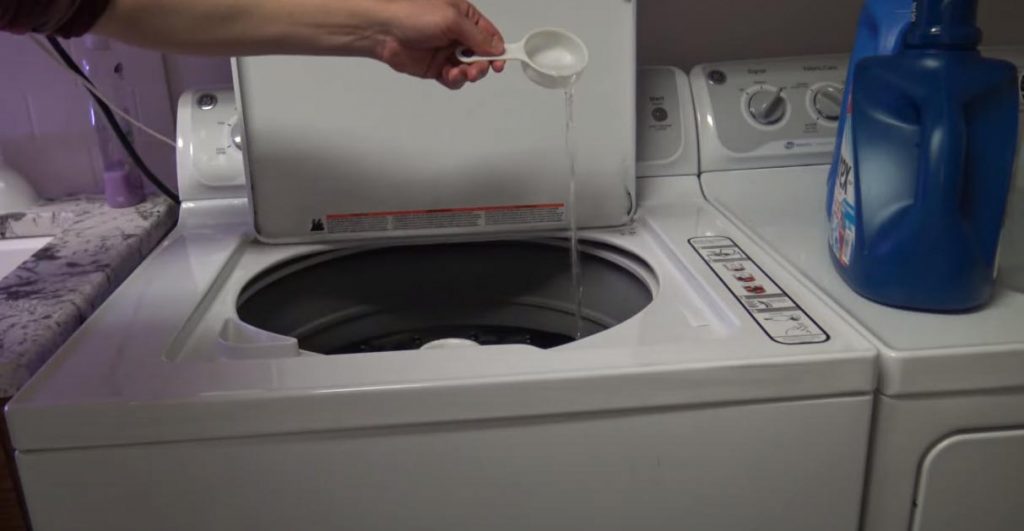
Mixing vinegar and laundry detergent
Mixing vinegar and laundry detergent is strictly prohibited to ensure the longevity of clothes. Both of them are chemically different. Therefore, nothing good would come if you use them together.
If mixed together, it won’t damage the fabric instantly, but it won’t do the desired cleaning either.
The rule of using vinegar in the laundry is to add it after the detergent has been rinsed out. How to do it? Follow the methods.
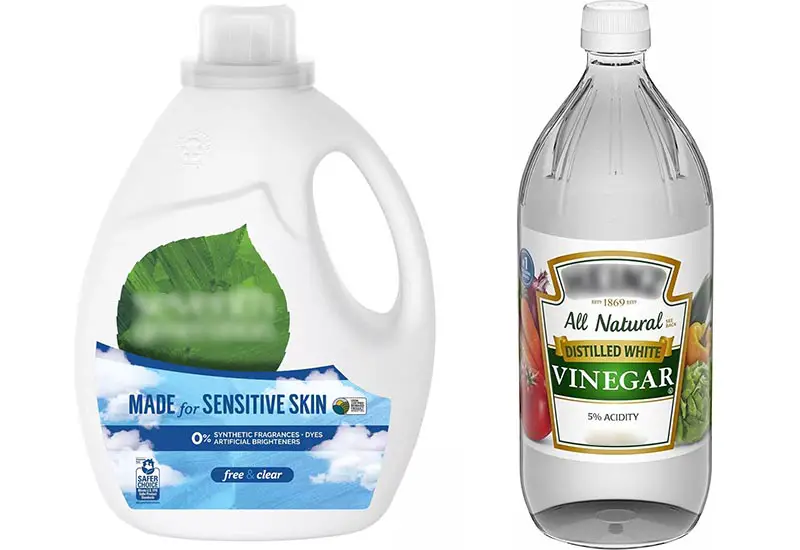
Method 1
- Firstly, wash your clothes with the laundry soap at normal rinse cycles.
- Secondly, once the soap has been rinsed out properly, add vinegar to the machine by hand.
Method 2
- Put the standard amount of vinegar in the fabric softener compartment of the machine. But before that, make sure your machine has this feature.
- Once the rinse cycle ends, the machine will automatically dispense the vinegar into the laundry.
White vinegar and laundry detergent
There are 15 types of vinegar in the world, including white vinegar, apple cider vinegar, rice vinegar, beer vinegar, etc. Among them, white vinegar is the safest option for doing laundry.
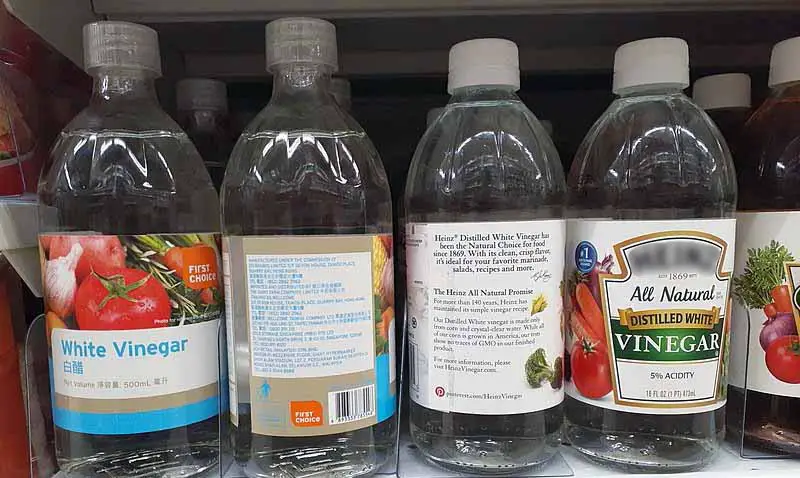
Distilled white vinegar does not contain additives, dyes, and other stain components. However, other vinegars have those components and stain fabrics instead of whitening them.
White vinegar is not a saint either. It is acidic, so directly applying it on the clothes will damage the fabric. Therefore, it is necessary to know the application guidelines of white vinegar beforehand.
Like white vinegar, applying apple cider vinegar directly is risky too. If you use apple cider vinegar, dilute it with water first. The ratio must be 60% water and 40% apple cider vinegar.
White vinegar is an all-rounder. It disinfects, deodorizes, whitens, and softens fabrics. On the other hand, laundry detergent breaks down and removes dirt’s and stains from clothes.
You may think that combining these two can boost washing clothes. But actually it won’t. Rather, these two are entirely different – ask how? Let’s learn it from the table below.
Vinegar for laundry detergent
A mixture of vinegar and laundry cleaner is unfit for cleaning clothes. It makes clothes oily instead of clean and fresh.
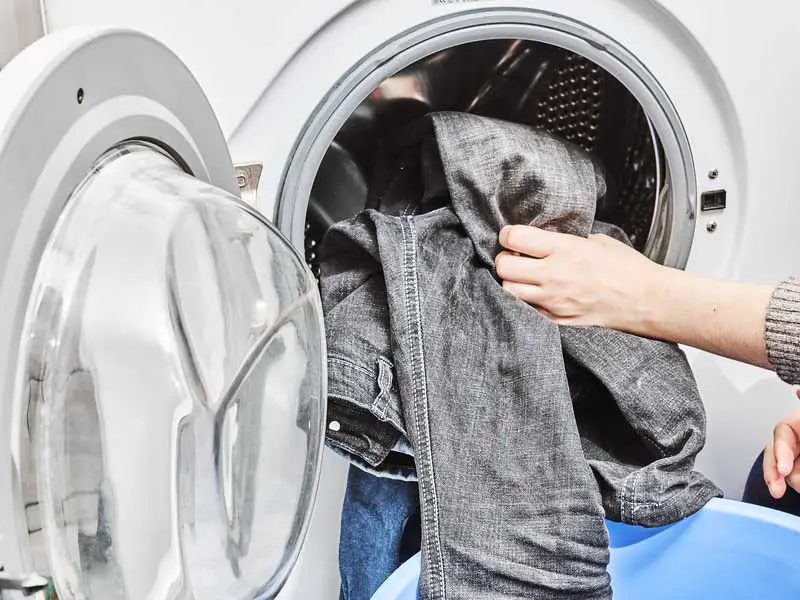
What happens if you mix vinegar and laundry detergent? Well, in that case, their pH value clashes. And vinegar weakens detergent’s cleaning power. The reaction between these two ends in making a neutral, ineffective solution.
Rather than mixing these two, use either one. Laundry soap or detergent is enough for cleaning dirty clothes. But you can take vinegar for laundry detergent during emergencies or regular times.
Here are the benefits of using vinegar as a laundry soap.
- Protects fabrics, sensitive skin, and the environment.
- Removes stains and brightens fabrics.
- Removes bad odors but does not make clothes smell like vinegar.
- Softens fabrics.
- Prevents build-ups and colors from fading.
- Disinfects and deodorizes clothes.
- Cleans the washing machine.
How much vinegar put in laundry
If you wash clothes with vinegar, you need to be careful about its amount. Machine-washing clothes with vinegar requires more attention than hand-washing.
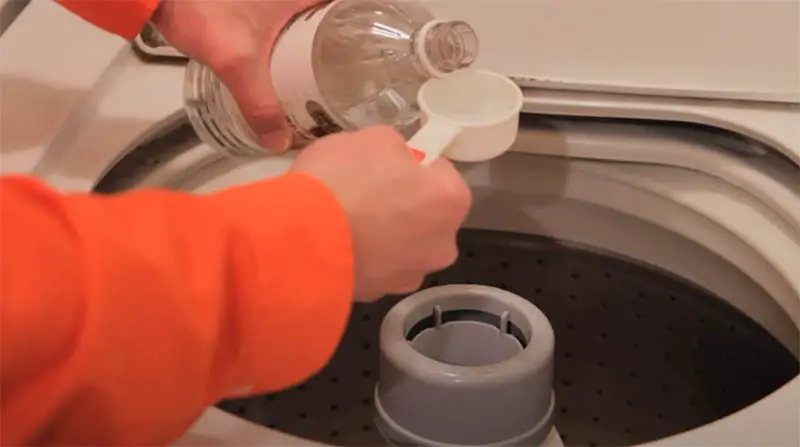
Vinegar has an acidic pH value. Accidental or deliberate use of excessive vinegar will damage the plastic parts of the washing machine. Also, the fabric will be at risk.
No matter how big your laundry pile is, always try to use the minimum amount of vinegar. For machine-washing clothes, don’t use more than ½ cup of vinegar per load.
½ cup is the average ideal amount, sometimes it varies. You must dilute it with 1 cup of water before using. And use vinegar in the machine not more than twice a week.
To fade stains on clothes, put a few drops of vinegar on the stain. Let it sit for a few minutes and wash it off.
You can use ½ cup of vinegar to clean your washing machine too. Just add the diluted vinegar to the machine and rinse it. It will clear away all dirt build-ups.
How much white vinegar in laundry
For removing stains
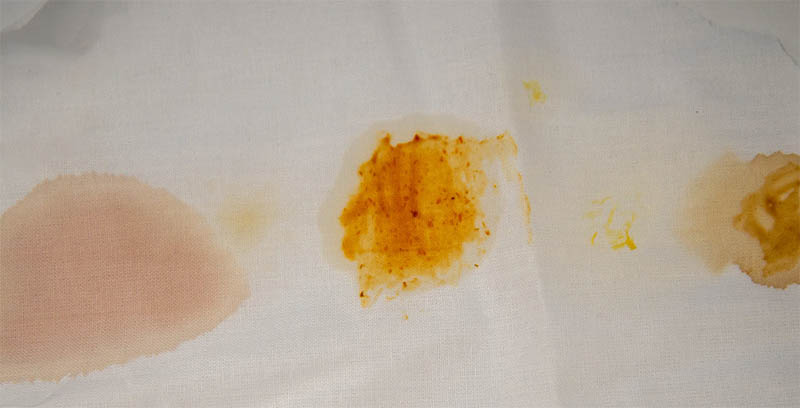
- Mix ⅓ cup of vinegar with ⅔ cup of water. Soak your stained clothes in this mixture for 10-30 minutes. Wash as usual and dry them in direct sunlight. This method is for removing coffee, tea, ketchup, and berry stains.
- To lift sweat stains from the clothes, pour a few drops of vinegar directly onto the stain. Then rub salt over it for 5 minutes. Finally, wash as usual.
- Got grass stains? Soak the stained clothes in ½ cup of undiluted vinegar for 30 minutes. Wash them as usual later. If the stains are stubborn, coat them before washing. Make a paste of vinegar and baking soda, coat the stains for 10 minutes, and wash.
For softening clothes
Vinegar works well as a fragrance-free fabric softener and static reducer. Dilute ¼ to ½ cup of vinegar and add it to the final rinse cycle. The amount would be 2 cups for washing blankets and comforters.
For brightening clothes
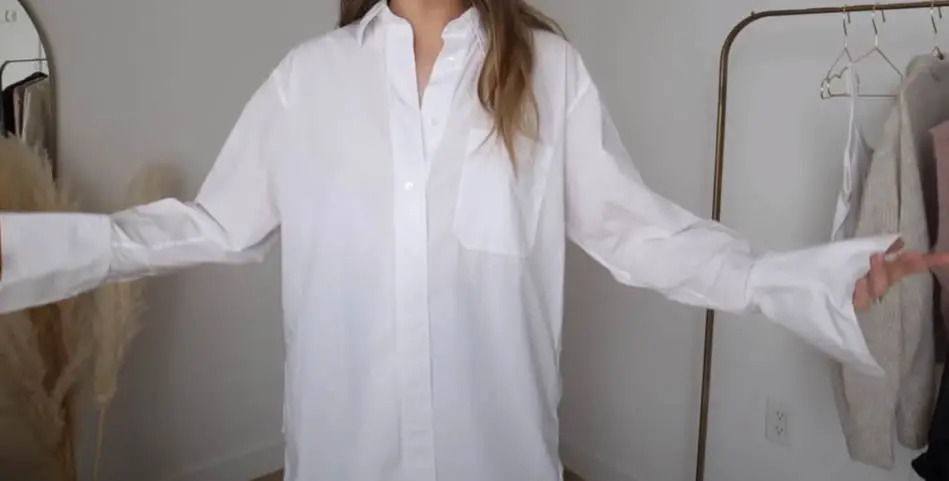
Pour ½ cup of vinegar when the rinse cycle is running. You can add it manually or by using the fabric softener compartment. But direct application won’t work for dingy white and colored clothes.
First, you have to add 1 cup of vinegar in a pot of boiling hot water. Next, soak the dingy clothes overnight. Finally, wash them the next day.
A bleach-like solution of white vinegar will add to the benefits. Mix ½ cup of vinegar, ½ cup of lemon juice, and 1 tbsp of borax. Add this mixture to the machine. Or, dilute this solution with a gallon of water and soak clothes in it.
For removing mildew odors
To remove smoke and mildew odors, add 2 cups of vinegar to the rinse cycle. And wash as usual.
For removing soap residue
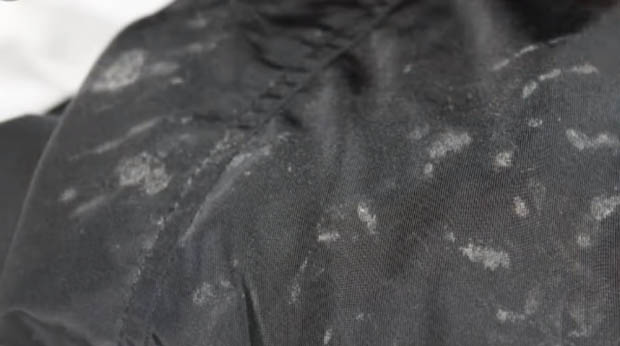
If you machine-wash, add a cup of vinegar to the rinse cycle to dissolve soap residue. If you hand-wash, the amount of vinegar would be a few tablespoons.
Soap residue causes blue, white, yellow, and dark streaks on clothes. To remove them, add 1 cup of vinegar to a gallon of water. Soak the clothes in the solution and wash them.
For removing lint and pet hair
Using vinegar in laundry makes clothes static-free. As a consequence, lint and pet hair find it hard to stick to the fabric. Adding ½ cup of vinegar to the rinse cycle is all you need to do to combat lint.
For preventing fading
Want to keep your new Denim new for longer? Mix equal parts of cold water and vinegar in a large bowl. Soak your Denim jeans in the solution for 1 hour. Wash and air dry it. While hand-washing skin-colored nylon tights, add a tablespoon of vinegar to the water and wash as normal.
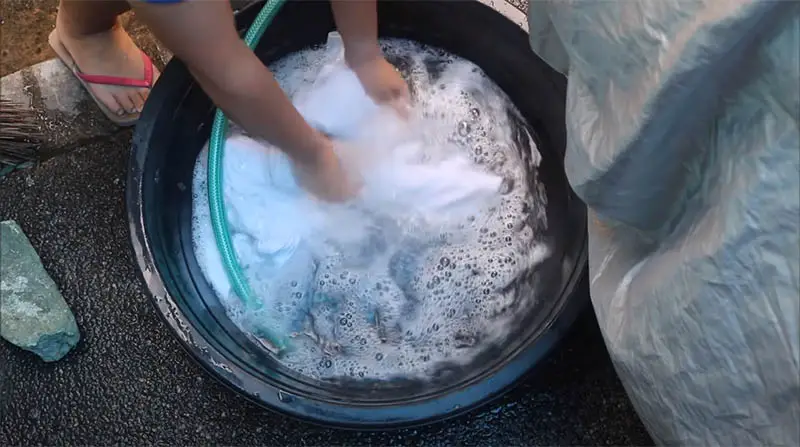
For deodorizing clothes
To deodorize smelly clothes, add ½ to 1 cup of vinegar in the machine. If you prefer sweet-smelling clothes, you can add a few drops of any essential oil.
FAQ
Can I use vinegar and detergent at the same time?
Not at all. Detergents are alkaline but vinegar is acidic. With different pH values, these two ingredients will make washing clothes difficult if you mix them.
They will create a neutral solution reducing the detergent’s cleaning ability. Also, clothes will turn greasy. Hence, use them separately during a single wash. Wash the clothes with detergent first. Once the detergent is out, add vinegar in the same load and rinse.
Does vinegar enhance laundry detergent?
Yes, it does. It is not only inexpensive but also it does many things to laundry which detergent may not do. Adding vinegar after using detergent will brighten, whiten, soften, and deodorize your clothes. Even when you are out of the laundry soap, you can use vinegar as an alternative.
What can you not mix with laundry detergent?
You cannot mix rubbing alcohol, vinegar, and fabric softener with detergent. Rather, mix borax or bleach with detergent to boost the cleaning properties and ability of it.
Can I mix baking soda and laundry detergent?
Of course not. Baking soda alone damages, stiffens, roughens, and fades colors of fabrics. When mixed with laundry detergent, baking soda reduces the detergent’s cleaning ability. Besides, the combination of baking soda and detergent fails to remove coffee, tea, wine, and sauce stains.
What does vinegar do for laundry?
Vinegar cleans clothes without harshness and efficiently removes dirt or stain particles. This inexpensive cleaning agent has antibacterial properties. It makes clothes odorless but does not leave its smell on them. Moreover, vinegar does not threaten the environment at all, while laundry detergent has the potentiality to do the opposite.
Verdict
Can you mix vinegar and laundry detergent to do laundry? You have got your answer, right?
As long as you follow this guideline, washing clothes will be easier for you. Besides, vinegar will save your bucks by reducing the necessity of buying fabric softener, color enhancer, etc. individually.
Keep in mind the fabric instructions too. Not all fabrics may need vinegar. Or, they may need another agent with vinegar. Hence, read the labels thoroughly to understand the preferred washing style.
I have also written about how much laundry detergent to use in carpet cleaner?
